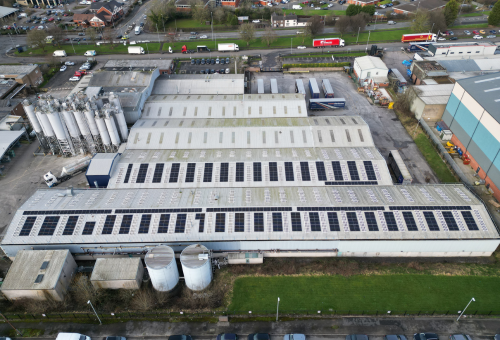The ARDEX Group UK has commissioned more than 1600 solar panels at its manufacturing facilities in Stoke-on-Trent and Haverhill.
The high-performance photovoltaic (PV) systems have been installed on warehousing and manufacturing units at both sites and will generate approximately 30% of the ARDEX Group UK’s electrical power requirements.
The installation of solar panels is part of a global sustainability initiative in which the company is investing around 3 million euros globally.
Installation of 1332 panels were completed at ARDEX UK in Haverhill in September last year and since commissioning, more than 269,686 kWh of solar energy has been produced – equivalent to the consumption of 100 houses.
A more modest 334 panels were installed at the Group’s Stoke-on-Trent facility – Building Adhesives Ltd in Trentham – with commissioning completing in March this year. This is due to limitations for more panels from the local grid, however plans remain to invest in more panels at Building Adhesives Ltd once the local grid has been updated and allows this to be done.
Since March 50,080 kWh of electricity has been produced – which is the equivalent of taking 9,814.4 kg CO2 out of the atmosphere or planting 594 trees. It meets 14% of total energy needs at Building Adhesives.
David Hackett, Managing Director of the ARDEX Group UK, said: “The installation of solar panels at our two UK manufacturing plants is an important part of our overall commitment to improve our sustainability performance in the UK.
“This has included ensuring our electricity is generated by renewable sources, increasingly adopting LED lighting throughout the facilities (100% completion in 2023), using battery-powered FLT’s (100% completion in 2023) and maximising the use of post-consumer waste in our packaging.
“We continue to look for sustainable solutions to meet our business requirements as we aim to be Carbon Neutral for our Scope-1 & 2 impacts by 2030.
“In addition, the installation of the panels makes us a bit more independent from current energy prices and possible energy shortages.”




